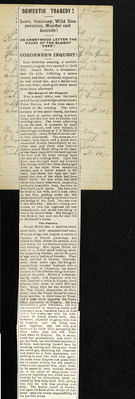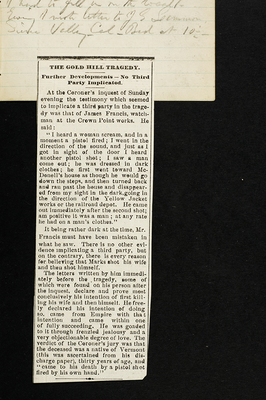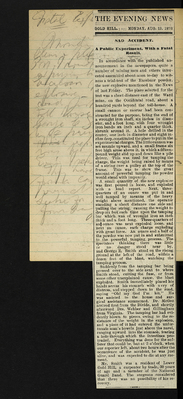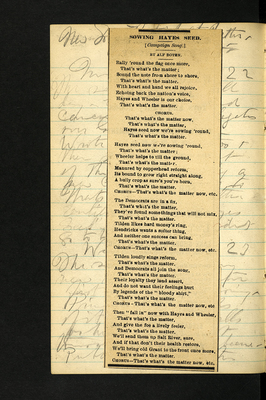Pages
1
BROUGHT BACK–Constable Tom Harkin returned home from San Francisco this morning, having in his custody Wilson Dunlap, the absconding broker. Dunlap, it will be remembered, absconded from Gold Hill in March last, after victimizing parties doing business with him to the amount of about 50,000. Constable Harkin arrested him in San Francisco last Sunday evening upon a charge of grand larceny. A warrant for his arrest was issued from Justice Wright's Court upon complaint of O. C. Mundell, proprietor of the Eclipse stable. At the time of Dunlap's flight he procured a horse and buggy–which he had formerly owned–at the above-named stable, ostensibly for the purpose of visiting Virginia City. On his arrival there he sold the outfit to Jonas Seely, Esq., and procured another conveyance to take him to Reno. Of his subsequent career but little is known, save that he turned up some months ago in San Francisco in the role of a curbstone broker. A requisition was made upon the Governor of California by Governor Bradley for the arrest of Dunlap upon a charge of grand larceny, as indicated above. Constable Harkin to-day delivered the prisoner into the custody of Sheriff Atkinson. Dunlap is to have a preliminary examination in Justice Wright's Court to-morrow. He will probably be held to await the action of the Grand Jury on four other counts. The prisoner, on his arrival here this morning, looked haggard and careworn, verifying the truth of the old adage, "The way of the transgressor is hard."
2
DOMESTIC TRAGEDY!
Love, Jealousy, Wild Desperation, Murder and Suicide!
AN ANONYMOUS LETTER THE CAUSE OF THE BLOODY DEED!
CORONER'S INQUEST!
Last Saturday evening, a terrible domestic tragedy was enacted in Gold Hill. Joseph Marks, a shoemaker, shot his wife, inflicting a severe wound, and then, evidently supposing he had killed her, sent a bullet into his own brain, causing his death about three hours afterward.
The Scene of the Tragedy
Was a small cabin, near the north end of the railroad bridge across Crown Point Ravine, and the time about 8 o'clock in the evening. The cabin consists of two small rooms, the front one used as parlor, sitting and bedroom, and the rear one as kitchen and working room. The house adjoining it, on the west, is occupied by some Cornish miners, and the next beyond is the cottage residence of J. E. McDonell and family–about 20 feet from the cabin first mentioned. The screams of a woman were heard, and a pistol shot, succeeding almost immediately by another shot, and those who hurried thither found Marks lying on the floor of the front room with his head against the wall and his arms resting upon the seat of a rocking chair. Upon the floor, near his right hand lay a Colt's five shooter with two shots discharged from it, the other three remaining loaded–and a buttle wound in his head, just above the right ear, indicated that one of the shots had done fatal work. He was alive, but died about two hours afterward, remaining perfectly insensible from the time he was found until death. The first shot he fired at his wife, and it took effect in her face, passing under the left cheek bone and ranging upward toward the bridge of the nose. She was shot in the doorway. She fell, rolling over a time or two, but regained her feet immediately, and as she was doing so heard the second shot. She thought it was fired at her, and ran for dear life to McDonell's house.
The Parties.
Joseph Marks was a medium sized, stout built, dark complexioned man, 239 years of age last August, a native of Canada, of French parentage, but raised in Ohio, where his parents died and where he has brothers and sisters still residing. Mrs. Agnes Marks, his wife, is a rather good looking, sensible appearing woman, nearly 29 years of age, and a native of Sweden. They were married in Denver, Colorado, some three years ago, she being divorced from another husband, who is still living at Cheyenne, her stated reasons for the divorce being drunkenness on his part. Marks is a shoemaker by trade, and together with his wife lived for a while at Eureka, from whence they came to Gold Hill last fall. Since then he has worked for Wm. Nicoll, shoemaker, on Main street, near the Vesey House for about three months, a short time at Woodruff's shoe store opposite the NEWS office, and lastly at Empire. He was considered a good workman, but was not successful in securing steady employment here, therefore went to Empire a few weeks ago with his wife, where he found steady work. She, however, objected to going with him to Empire, and not living happily together, she left him and returned to Gold Hill, occupying the little cabin they had left when they went to Empire. He, it seems, loved her passionately, and tried to get her back, but she refused and scorned him, maintaining herself here by washing, sewing and doing any work she could get, declaring her intention and desire for a final separation, not wishing to ever live with him again. He came from Empire and plead with her to return to him, but she steadily refused and repulsed him, until finally, he seems to have worked himself up to the pitch of desperation and jealousy regarding her, aided very materially by an anonymous letter received by him from Gold Hill, telling him that his wife was playing him false. The fearful result is known, and upon the head of the writer of that letter rests the entire responsibility of the terrible crime.
3
THE GOLD HILL TRAGEDY.
Further Developments–No Third Party Implicated.
At the Coroner's inquest of Sunday evening the testimony which seemed to implicate a third party in the tragedy was that of James Francis, watchman at the Crown Point works. He said:
"I heard a woman scream, and in a moment a pistol fired; I went in the direction of the sound, and just as I got in sight of the door I heard another pistol shot; I saw a man come out; he was dressed in dark clothes; he first went toward McDonell's house as though he would go down the steps, and then turned back and ran past the house and disappeared from my sight in the dark, going in the direction of the Yellow Jacket works or the railroad depot. He came out immediately after the second shot; am positive it was a man; at any rate he had on a man's clothes."
It being rather dark at the time, Mr. Francis must have been mistaken in what he saw. There is no other evidence implicating a third party, but on the contrary, there is every reason for believing that Marks shot his wife and then shot himself.
The letters written by him immediately before the tragedy, some of which were found on his person after the inquest, declare and prove most conclusively his intention of first killing his wife and then himself. He freely declared his intention of doing so, came from Empire with that intention and came within one of fully succeeding. He was goaded to it through frenzied jealousy and a very objectionable degree of love. The verdict of the Coroner's jury was that the deceased was a native of Vermont (this was ascertained from his discharge paper), thirty years of age, and "came to his death by a pistol shot fired by his own hand."
4
THE EVENING NEWS
GOLD HILL. : : : : MONDAY, AUG. 13, 1876
SAD ACCIDENT.
A Public Experiment, With a Fatal Result.
In accordance with the published announcement in the newspapers, quite a number of mining men and others interested assembled about noon to-day to witness a trial-test of the Excelsior powder, the new explosive mentioned in the NEWS of last Friday. The place selected for the test was a short distance east of the Ward mine, on the Occidental road, about a hundred yards beyond the toll-house. A small cannon or mortar had been constructed for the purpose, being the end of a wrought iron shaft, six inches in diameter, and a foot long, with four wrought iron bands an inch and a quarter thick, shrunk around it. A hole drilled in the center, one inch in diameter and eight inches deep, constituted the place to put in the experimental charges. The little cannon was set muzzle upward, and a small frame six feet high arose above it, in which a fifteen-pound weight slid up and down like a pile driver. This was used for tamping the charge, the weight being raised by means of a string over a pulley at the top of the frame. This was to show the great amount of powerful tamping the powder would stand with impunity.
A small quantity of the new explosive was first poured in loose, and exploded with a loud report. Next, three quarters of an ounce was put in and well tamped by means of the heavy weight above mentioned, the operator standing a short distance one side and pulling the string, causing the weight to drop six feet each time upon the tamping bar which was of wrought iron an inch thick and a foot long. Three-quarters of an ounce was next exploded loose, and next an ounce, each charge exploding with great force. An ounce and a half of the powder was now put in and submitted to the powerful tamping process. The spectators thinking there was little or no danger stood near by, and George E. Smith stood on the rising ground at the left of the road, within a dozen feet of the blast, watching the tamping process.
Suddenly from the tamping bar being pressed over to the side next to where Smith stood, cutting the fuse, or from some other unexplained cause, the blast exploded. Smith immediately placed his hands across his stomach with a cry of distress, and stepped down to the road, saying "Oh! my God I'm hit." He was assisted to the house and surgical assistance summoned. Dr. McGee arrived first from the Divide, and shortly afterward Drs. Webber and Gillingham from Virginia. The tamping bar was evidently blown to pieces, owing to the resistance of the weight in the explosion, and a piece of it had entered the unfortunate man's bowels just above the navel, ranging upward into the stomach, tearing a hole through which the intestines protruded. Everything was done for the sufferer that could be, but at 3 o'clock, when our reporter left, about two hours after the occurrence of the accident, he was just alive and was expected to die at any moment.
Mr. Smith was a resident of Lower Gold Hill, a carpenter by trade, 30 years of age and a member of the National Guard Band. The surgeons considered that there was no possibility of his recovery.
5
SEWING HAYES SEED.
[Campaign Song.]
BY ALF DOTEN,,
Rally 'round the flag once more, That's what's the matter; Sound the note from shore to shore, That's what's the matter. With heart and hand we all rejoice, Echoing back the nation's voice, Hayes and Wheeler is our choice, That's what's the matter.
CHORUS That's what's the matter now, That's what's the matter, Hayes seed now we're sowing 'round, That's what's the matter.
Hayes seed now we're sowing 'round, That's what's the matter; Wheeler helps to till the ground, That's what's the matter. Manured by copperhead reform, Its bound to grow right straight along, A bully crop as sure's you're born That's what's the matter. CHORUS–That's what's the matter now, etc.
Tilden loudly sings reform, That's what's the matter, And Democrats all join the song, That's what's the matter. Their loyalty they loud assert, And do not want their feelings hurt By legends of the "bloody shirt," That's what's the matter. CHORUS–That's what's the matter now, etc.
Then "fall in" now with Hayes and Wheeler, That's what's the matter, And give the foe a lively feeler,
We'll send them up Salt River, sure, And if that don't their health restore, We'll bring old Grant to the front once more, That's what's the matter. CHORUS–That's what's the matter now, etc.






